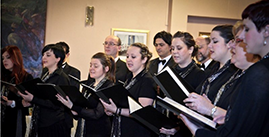On celebration of family patron saint’s day ("slava")
The celebration of the Family Patron Saint's Day (or "Slava" in Serbian) is a Serbian custom which represents one of the main forms of expression of the Orthodox faith in Serbs, and which is not practiced by any other people. On that day, the celebrating family celebrates its patron saint who prays for that family before the Lord. Not only a family – a church, city, village, and even a trade or an association can have its own Slava.
There are different answers to why only the Serbs, of all Orthodox peoples, celebrate the Patron Saint's Day. Certain historians and ethnologists believe that the Christian Slava is the substitute for the worship of domestic gods, as each tribe or family had its own domestic god (the Serbs were polytheistic before they converted to Christianity).
Others believe that the Slava is linked to the times of mass conversion of the Serbian clans in the 9th century when, as a way to commemorate the conversion, the tribes started celebrating the Saint's Day that occurred at the time of the conversion or the Saint's Day of their choice.
None of the two stances provides the answer as to why no other Slavic people celebrates the Slava, even though they too were initially polytheistic and adopted Christianity at the later date.
All of the aforestated, combined with certain historic data, indicate that only after the time of Saint Sava (who embedded the liturgical spirit to the Slava celebration) and his efforts and dedication did the Slava became a generally adopted and deep-rooted custom among the Serbs of Christian faith, which is celebrated both by the Serbs living in their homeland and abroad.
The celebration of the Family Patron Saint's Day varies slightly in different areas inhabited by the Serbs, which of course reflects the different historical circumstances in which they lived. In spite of that, and regardless of the local differences, the essence has remained unchanged. That is the beauty and the importance of the Slava, celebrated by the Serbs throughout the centuries as a symbol of the Christian and national identity.
It is customary that the Slava is passed on from the father to the son (or to a male descendant), with the daughter inheriting the Slava only if the husband moves in with her after marrying; married women usually celebrate their husband's Slava. Each family celebrates one or more Family Patron Saint's Days, and some celebrate even more Slavas (e.g. they can celebrate an additional Slava to preserve the Slava of a woman who is the only descendant of a family, or they can celebrate the "votive Slava").
In the past, sons celebrated the Slava with their fathers, and switched to celebrating the Slava on their own only after the father had passed on the Slava to his son; this was all in line with the life-style of those times.
However, today's life-style involves moving out of one's parents' home, so the son may and should celebrate the Slava in his home, with his own family, after receiving his father's permission and blessing.
The Slava celebration brings the whole family together, and on that day the Slava feast, consisting of traditional dishes, is usually served. We use this opportunity to reiterate that the dishes of the Slava feast must strictly observe the fast – if the Slava is celebrated during a fast, the dishes should be compatible with the fast, and vice versa.
V. Rev. Dragan A. Lazić






